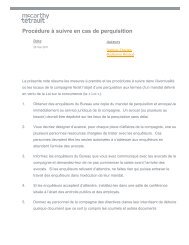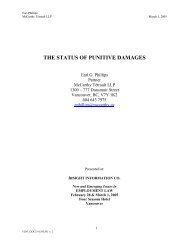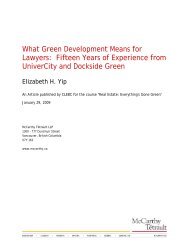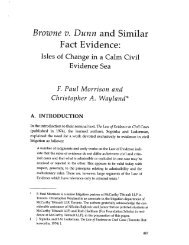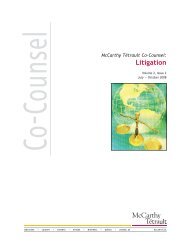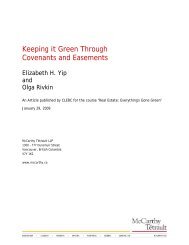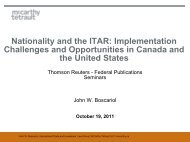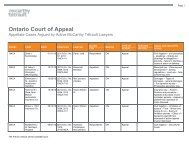The Doctrine of Public Policy in Canadian Contract Law
The Doctrine of Public Policy in Canadian Contract Law
The Doctrine of Public Policy in Canadian Contract Law
You also want an ePaper? Increase the reach of your titles
YUMPU automatically turns print PDFs into web optimized ePapers that Google loves.
6 / Annual Review <strong>of</strong> Civil Litigation<br />
even taken the veil <strong>of</strong> anonymity."27 It is therefore necessary for the purposes<br />
<strong>of</strong> this paper to adopt a dist<strong>in</strong>ction formulated by W<strong>in</strong>field between:<br />
. .the unconscious or half-conscious use <strong>of</strong> it which probably pervaded the whole<br />
legal system when law had to be made <strong>in</strong> some way or other, and. . . the conscious<br />
application <strong>of</strong> public policy to the solution <strong>of</strong> legal problems, whether it bore the<br />
name by which it is now known or was partly concealed under some other<br />
designation.28<br />
<strong>The</strong> first species <strong>of</strong> public policy has been identified with equity, the<br />
natural law, the law <strong>of</strong> reason, and ultimately the div<strong>in</strong>e law. It is referred to by<br />
early legal commentators with wonder, as an animistic spirit dwell<strong>in</strong>g deep<br />
with<strong>in</strong> our jurisprudence that is "written <strong>in</strong> the heart <strong>of</strong> every man and tells him<br />
what to do and what to avoid."29 Ultimately, it was <strong>in</strong> the gradual rationalization<br />
<strong>of</strong> this supra-human tendency aga<strong>in</strong>st which "[n]either statute nor custom can<br />
prevairm that the modern idea <strong>of</strong> public policy was first developed and readied<br />
for conscious application.<br />
In its orig<strong>in</strong>s, this second manifestation <strong>of</strong> public policy was still a highly<br />
<strong>in</strong>tuitive concept, dist<strong>in</strong>guishable only from natural law via the secular nature<br />
<strong>of</strong> its authority. Both Knight and W<strong>in</strong>field f<strong>in</strong>d its earliest expression <strong>in</strong> highly<br />
general dictums by Littleton and Coke that the law will not permit that which<br />
is "<strong>in</strong>convenient" to the public good to triumph for the sake <strong>of</strong> the private<br />
good.3' At this nascent phase:<br />
[t]he doctr<strong>in</strong>e, concealed under widest generalization, operates, <strong>in</strong> fact, because<br />
<strong>of</strong> some gap <strong>in</strong> [the] law, though only where the dom<strong>in</strong>ant consideration is the<br />
good <strong>of</strong> the community — the supreme law — with, it may be, some special<br />
consideration for the rights or <strong>in</strong>terests <strong>of</strong> <strong>in</strong>dividuals other than those immediately<br />
concerned <strong>in</strong> the matter the subject <strong>of</strong> suit.-42<br />
Yet although "[t]he present law is the result <strong>of</strong> a development that stretches<br />
back to at least Elizabethan times. . . its foundations were not effectively laid<br />
27 W<strong>in</strong>field, supra note 1, at 76.<br />
28 Ibid. at 77. This dist<strong>in</strong>ction is occasionally recognized <strong>in</strong> the case law: see, e.g., Fender<br />
v. Mildmay (1937), [1938] A.C. 1 (H.L.) at 38.<br />
29 W<strong>in</strong>field, supra note I at 78, writ<strong>in</strong>g <strong>in</strong> reference to "the dawn <strong>of</strong> our law" and St.<br />
Germa<strong>in</strong>, Doctor and Student (1523) bk. I, cc. II.<br />
30 Ibid. at 78.<br />
31 Knight, supra note 2 at 207-8; W<strong>in</strong>field, supra note 1, at 80-83. Both authors refer to<br />
Coke's maxim "nihil quad <strong>in</strong>conveniens est licitu<strong>in</strong>" <strong>in</strong> Co. Litt. at s. 138, which W<strong>in</strong>field,<br />
at 82, states "was perhaps rightly taken by later authorities to lay down the doctr<strong>in</strong>e <strong>of</strong><br />
public policy, or at least to conta<strong>in</strong> the seeds <strong>of</strong> formal ideas about it." This maxim has<br />
been translated as "tilt is better saith the law to suffer a mischief that is peculiar to one<br />
than an <strong>in</strong>convenience that may prejudice many": Deckert v. Prudential Insurance Co.,<br />
[1943] O.R. 448, [1943] O.J. No. 467 (C.A.) at para. 31.<br />
32 Knight, supra note 2 at 208.



